Pro-Kremlin actors cast doubt on Georgia’s neutrality in Nagorno-Karabakh conflict
Unverified and false claims surfaced about
Pro-Kremlin actors cast doubt on Georgia’s neutrality in Nagorno-Karabakh conflict
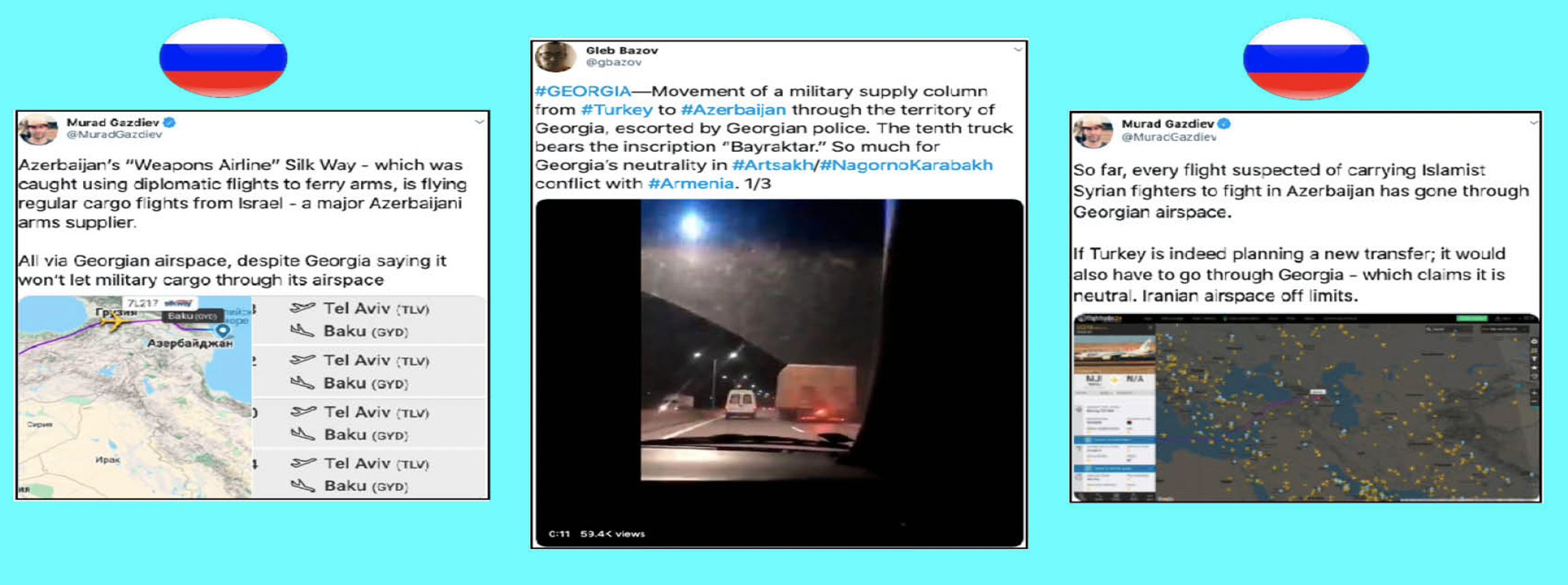
Unverified and false claims surfaced about Georgia’s transport of military cargo, alleged blocking of humanitarian aid to Armenia
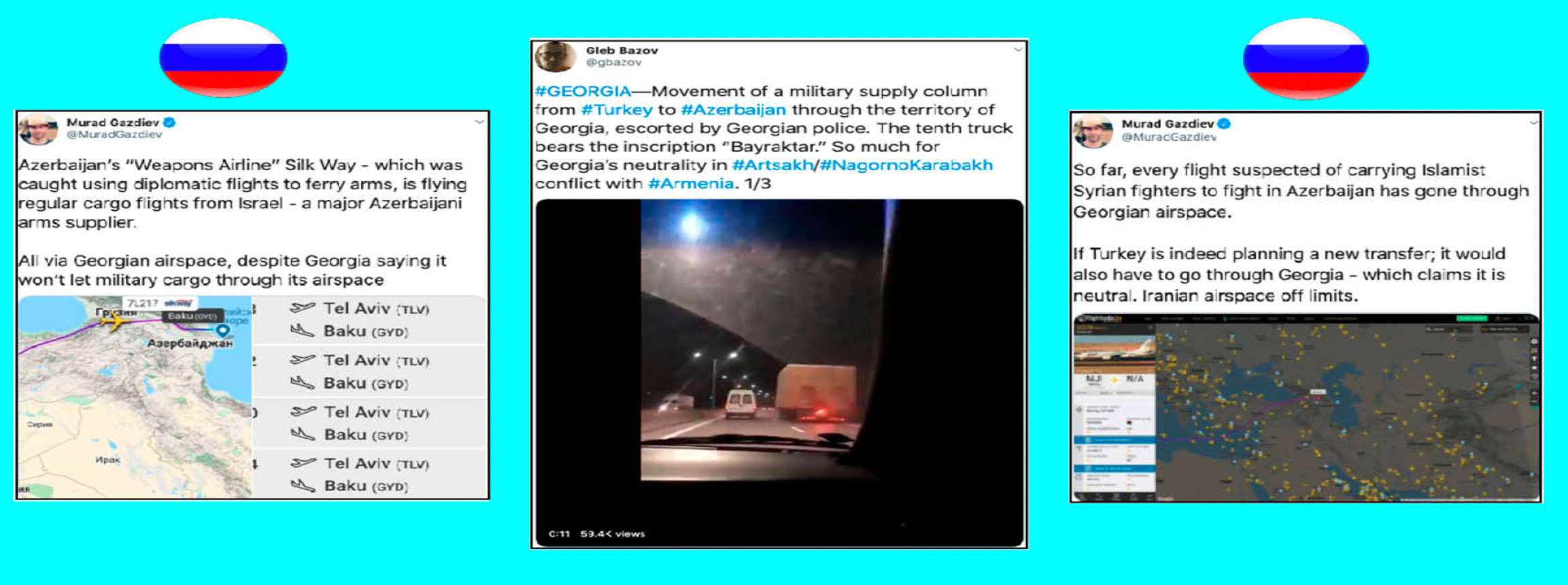
Amid the military escalation between Azerbaijan and Armenia in Nagorno-Karabakh, multiple actors started to disseminate false information accusing Georgia of taking Baku’s side. A DFRLab analysis shows that some pro-Kremlin actors also saw fertile ground to spread false narratives and call Georgia’s neutral position in the conflict to question. The spread of this unsubstantiated information risks sowing discord between Georgia and its neighbors as well as creating tensions between Armenian and Azerbaijani ethnic minorities living in Georgia.
On September 27, 2020, military clashes erupted along the line of contact, which separates the disputed Nagorno-Karabakh region from Azerbaijan. As of October 8, 2020, more than 360 people have been killed as a result, and thousands forced to leave their homes. The military conflict has been accompanied by an information war, with traditional and social media on both sides overflowing with rumors and clashing narratives. Since the outbreak of the skirmishes between Azerbaijan and Armenia, Georgia has maintained a neutral position, which is mostly dictated by the fact that Azerbaijanis and Armenians are the two largest ethnic minorities in the country, making up 6.3 percent and 4.5 percent of Georgia’s population respectively.
The ongoing disinformation campaign against Georgia could affect the results of the upcoming parliamentary elections, as false information can be used to manipulate public opinion among ethnic minorities. According to the official data of the Central Election Commission, the number of ethnic minority voters in 2018 stood at 290,618 people, almost 9 percent of the total number of voters in Georgia. The disinformation campaign, if left unchecked, can create internal ethnic tensions and result in political turbulence and further polarization.
Pro-Kremlin activist disseminates misleading video
On October 3, 2020, Twitter user Gleb Bazov posted three videos showing cargo trucks allegedly lined up on a road in Georgia. His tweets claimed that the video depicted trucks with military supplies on their way from Turkey to Azerbaijan through the territory of Georgia. He underlined that one of the trucks in a video had an inscription “Bayraktar” (insinuating these were Turkish trucks) and that the Georgian police cars escorted the trucks. Based on his observations, Bazov concluded that Georgia is allowing Turkey to transit military cargo and, consequently, is not in fact neutral in the Nagorno-Karabakh conflict. “So much for Georgia’s neutrality,” he wrote.
https://twitter.com/gbazov/status/1312439414174306307
Even though Bazov was not the first person to spread these videos, his behavior on Twitter indicates that he did not simply repost the misleading video: his actions were deliberately aimed at convincing his audience that the video truly shows the transit of Turkish military cargo. To that end, Bazov replied to critical comments on his tweets by posting the same identical text, arguing that the trucks were traveling at night to cover their movement and that the wooden carriages for these trucks were built for oversized cargo.
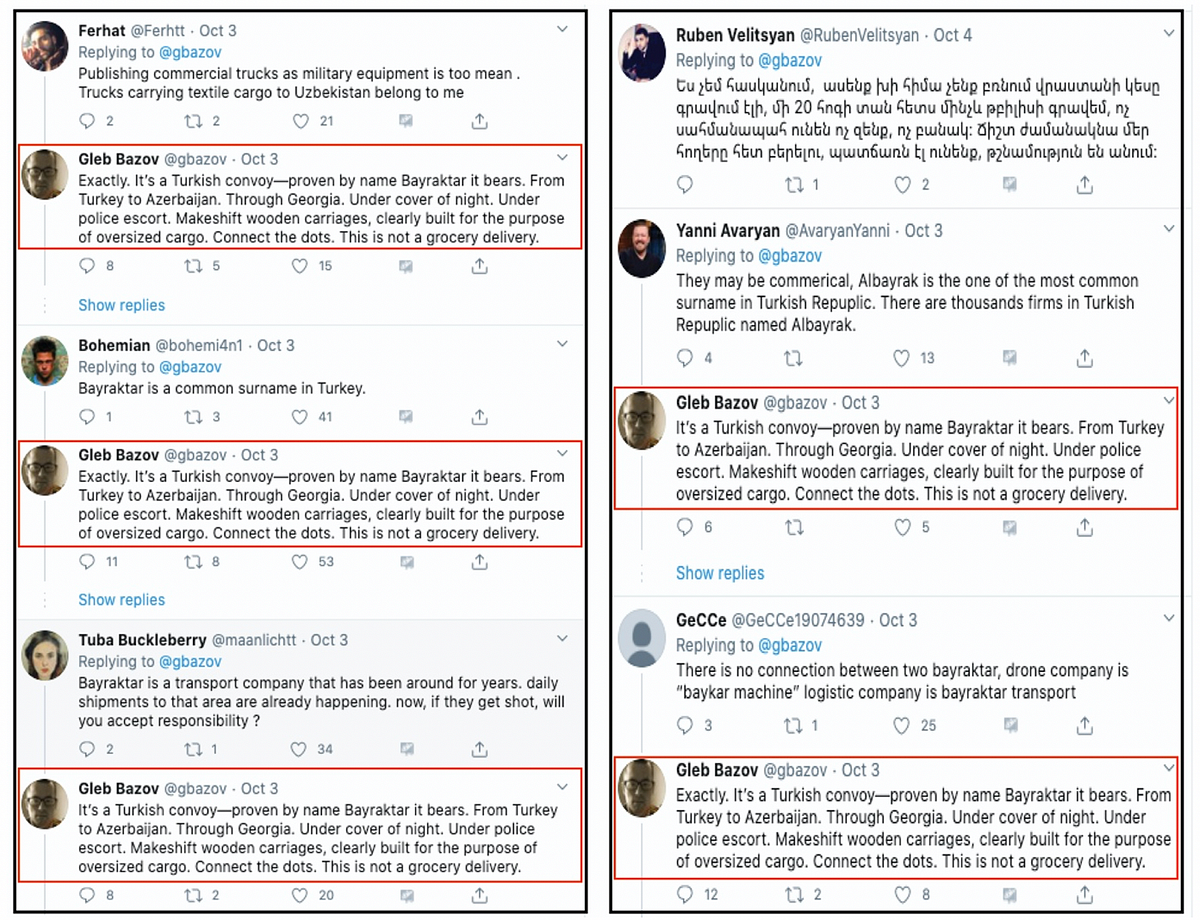
The DFRLab checked the uploaded videos and confirmed that one of the police cars shown in one video had a Georgian license plate number, which most likely (but not necessarily) indicates that the video was indeed taken in Georgia. However, Bazov’s videos do not contain evidence proving that trucks are transporting military cargo. Bazov’s claim about a “military supply“ is mainly based on the inscription “Bayraktar” appearing on one of the trucks in a video. The Bayraktar TB2 is the name of Turkish unmanned combat aerial vehicle, produced by Baykar Makina company. As some sources suggest, Azerbaijan is using Turkish Bayraktar TB2 drones against Armenian forces during the latest escalation of the conflict. However, Bayraktar is also the name of a Turkish transport company, Bayraktar Logistics. Importantly, other trucks visible in the video have inscriptions of Turkish transport logistic companies, such as Esen, Cavdaroglu, Ozlider, Caglayan, and Ipekyol.
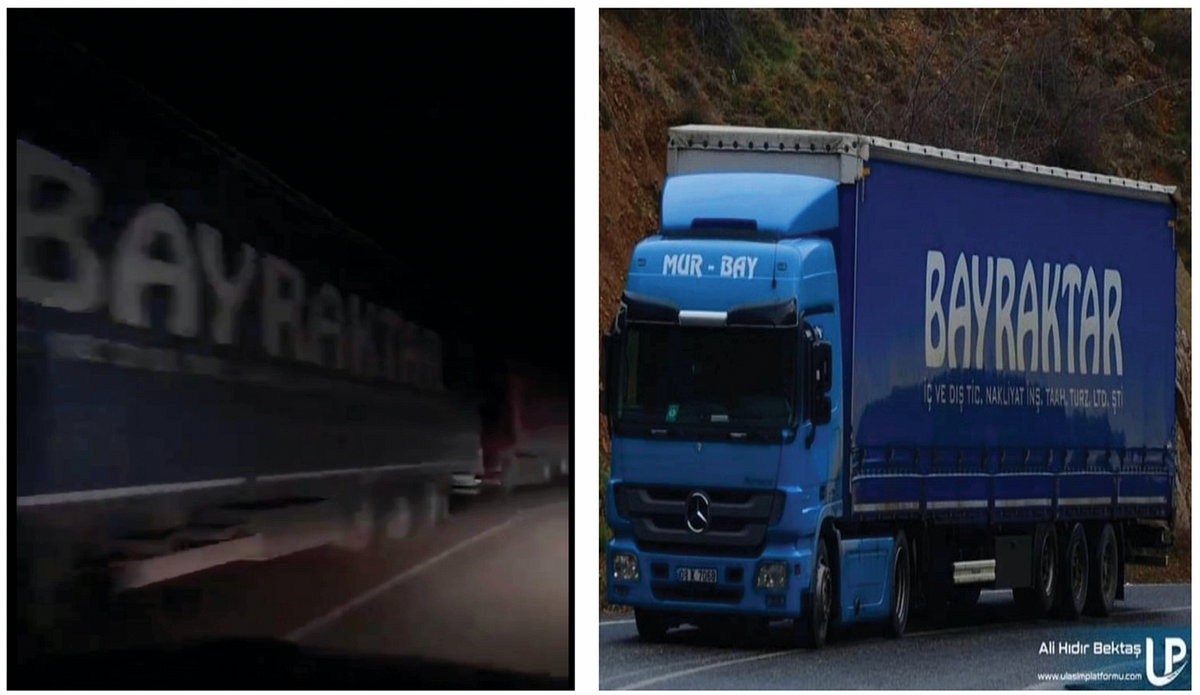
Bazov seems to be trying to deceive people that this truck belongs to Turkish company Baykar, which produces Bayraktar TB2 drones. However, immediately after the outbreak of clashes in Nagorno-Karabakh on September 27, 2020, the Georgian government suspended the issuance of permits for transiting military cargo through its territory and airspace to Armenia and Azerbaijan. Both parties were notified about this decision. Movement of commercial cargo trucks to Armenia and Azerbaijan through Georgia’s territory is, nevertheless, allowed as usual and 700–800 commercial cargo trucks cross the Georgia-Azerbaijan and Georgia-Armenia borders daily. Therefore, it is highly unlikely that a military cargo truck was allowed to transit through the Georgian territory despite suspension of permits by the Georgian authorities, let alone in a truck with a military drone name so clearly displayed.
Gleb Bazov’s profile picture on Twitter exhibits Ribbon of Saint George, a Russian symbol that originally referred to the Eastern Front in World War II. The ribbon is also used by activists supporting Russia’s invasion of Ukraine in 2014 and for Ukrainians it has become a symbol of Russian aggression. His Twitter bio also shows that Bazov is a columnist at Slavyangrad.org, which according to Euromaidan Pres, was created to legitimize so-called Novorossiya (the self-proclaimed Union of Lugansk and Donetsk republics in eastern Ukraine) and discredit Ukraine. Meanwhile, Slavyangrad.org lists the South Front website as one of its partners; the DFRlab has previously reported on an inauthentic network on Facebook connected to South Front, a propaganda outlet supporting Russia’s security services.
RT correspondent calls Georgia’s neutral position into question
Another unsubstantiated claim came from RT correspondent Murad Gazdiev. He tweeted that every airplane that was suspected to transport Syrian fighters to Azerbaijan had flown through Georgian airspace. He backed this claim with a Flightradar24 screenshot that showed an aircraft with flight number UZ218 flying from Tripoli, Libya to Baku, Azerbaijan on September 29, 2020. Gazdiev also claimed in a separate tweet that Azerbaijani Silk Way Airlines carried military cargo from Israel to Azerbaijan through Georgian military space, effectively putting Georgia’s neutrality into question.
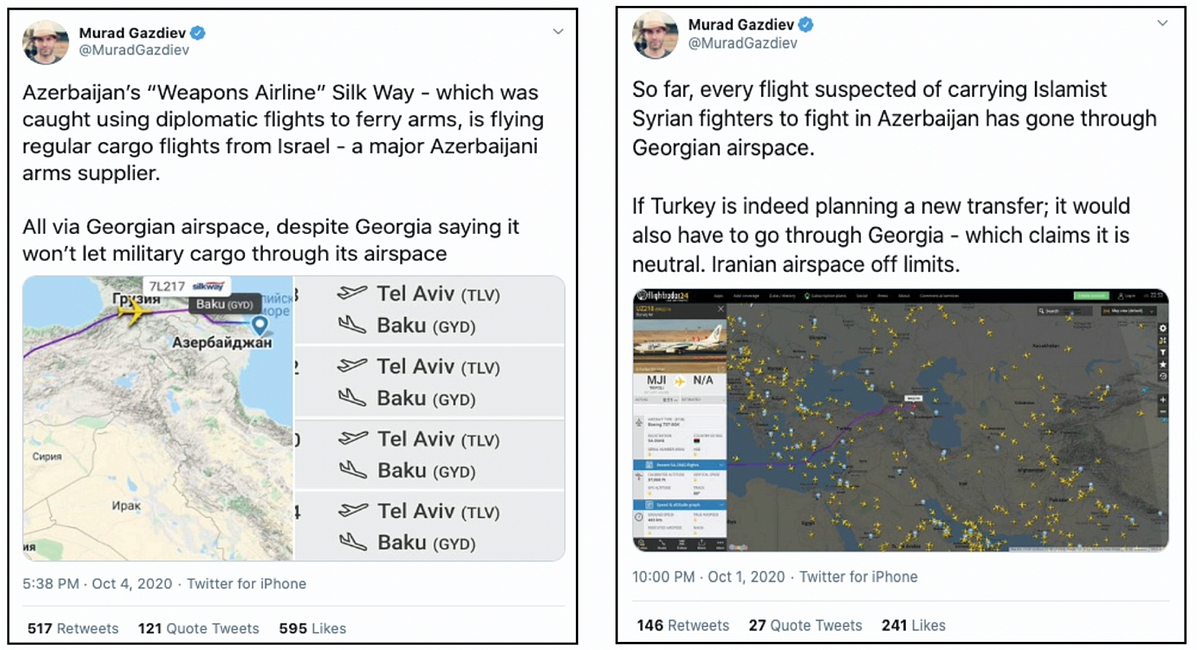
Gazdiev did not provide evidence proving that all flights that allegedly transported Syrian fighters to Azerbaijan flew over Georgia, or indeed that the flight from the screenshot carried Islamic fighters. Similarly, there is no hard evidence proving that the Silk Way West Airlines carried military cargo from Israel to Azerbaijan through Georgian territory, as the flight displayed in his tweet is a commercial flight. In order to transport military equipment, Azerbaijan needs to ask for Georgia’s permission, which it would not have received since the outbreak of the conflict. Georgia’s State Security Service denied allegations that Syrian fighters or military equipment were being transported through Georgia. On October 7, the Armenian Prime Minister’s Chief of Staff, Eduard Aghajanyan, released a statement on Facebook saying that some users on social media were spreading disinformation representing “Georgia and the Georgian people as supporters of the Azerbaijani side in this war.”
Kremlin’s ally accused Georgia of blocking humanitarian aid sent to Armenia
On October 4, 2020 the Eurasia Daily online journal published an article saying that Georgia blocked the transit of humanitarian aid to Armenia, collected by the Armenian diaspora in Russia, through its territory. The article quotes a Kremlin ally of Georgian origin, Vladimer Khomeriki, the president of the Foundation of the Unity of Russian and Georgian Nations. Khomeriki claimed that representatives of Armenia had appealed to the Georgian Foreign Ministry to obtain permission for the transit of humanitarian cargo to Armenia, but Georgia refused to issue the permission. As a result, 12 cars with humanitarian cargo supposedly got stuck in Moscow, and members of the Armenian diaspora was preparing an appeal to the UN Human Rights Council to solve this issue. The DFRLab used the BuzzSumo social media monitoring tool and found that the Eurasia Daily article garnered a modest 4,700 engagements as of October 8, 2020.
However, the information spread by Khomeriki proved to be false. The Embassy of Armenia to Georgia promptly clarified the issue on Facebook, stating that claims about Georgia’s refusal to “transit humanitarian aid to Armenia do not correspond to reality.”
The DFRLab’s analysis showed that pro-Kremlin actors are trying to drive a wedge between Georgia and Armenia by pushing false claims about Georgia’s position on the Nagorno-Karabakh conflict. Such campaigns can have multiple objectives, stretching from manipulating public opinion ahead of elections to inciting ethnic tension and violence in Georgia.
This research is part of the #ElectionWatch Georgia project in partnership with On.ge, made possible through support from East-West Management Institute (EWMI) and US Agency for International Development (USAID). Contents of this report are the sole responsibility of the author and do not necessarily reflect the views of EWMI, USAID or US Government.
Follow along on Twitter for more in-depth analysis from our #DigitalSherlocks.

